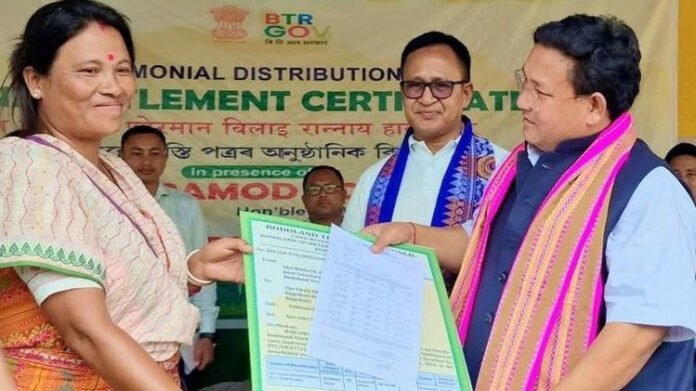The Assam government handed over land titles to more than 1,200 landless families in Parbatjhora subdivision under Kokrajhar district. This long-awaited move brought relief to marginalized communities that had been waiting for decades to gain legal ownership of the land they occupy.
During a public distribution ceremony held in Parbatjhora, officials emphasized that the initiative is part of a larger mission to address landlessness and provide basic human rights to underprivileged families in remote areas of Assam.
Read More: AI Revolutionising Education in Tripura: CM Saha at MBB University
Government Fulfills Long-Pending Promises
The distribution of land titles in Parbatjhora fulfills a long-standing commitment of the Assam government to regularize land holdings in tribal and backward areas. Chief Minister Himanta Biswa Sarma had earlier declared land ownership as a top governance priority, particularly in regions where communities live without legal documents.
According to local officials, the beneficiaries include Scheduled Tribe (ST) and Scheduled Caste (SC) families, as well as other economically weaker sections. The land titles will give families access to state welfare schemes, credit facilities, and secure housing rights.
Bringing Stability and Legal Protection
Landless families have long faced the risk of eviction due to the lack of formal ownership. By issuing legal land titles in Parbatjhora, the government ensures that these citizens can live without fear of displacement.
Speaking at the event, a district official noted that the titles were issued after thorough land surveys and consultations with local councils. Each family received a patta (land deed) indicating the size, location, and ownership status of their plot.
“Land is not just a resource; it is dignity, identity, and a future,” the official remarked.
Transparency Through Digitization
The land distribution process has been digitized to maintain transparency and prevent corruption. All land records are now being uploaded to the state’s digital database. Officials assured that each beneficiary can verify their title online and apply for updates or corrections as needed.
By using digital tools, the administration aims to streamline future land-related services such as inheritance, transfer, and sale, reducing the burden on both villagers and government offices.
This digitized model is expected to be replicated in other land reform initiatives across Assam.
Voices From the Ground
Beneficiaries expressed a deep sense of relief and joy upon receiving their land documents. For many, the day marked the end of years of uncertainty and struggle.
“My family has lived on this land for 30 years, but we never had legal rights. Now, we finally feel secure,” said Lakhinath Basumatary, a farmer who received a land title for his one-acre plot.
Women were also among the recipients, with land registered jointly in the names of both spouses in several cases. Officials said this step supports gender equity and safeguards women’s rights to land ownership.
Future Benefits for the Community
Receiving land titles in Parbatjhora opens the door for these families to build pucca homes under PMAY (Pradhan Mantri Awas Yojana), obtain agricultural loans, and access basic infrastructure such as roads and electricity.
Officials also hinted that the state government may launch follow-up initiatives to help families develop the land, including subsidies for farming tools and water irrigation systems.
This land reform effort aligns with the broader national vision of “Housing for All” and rural empowerment.
Part of a Statewide Push
The Parbatjhora initiative is part of Assam’s larger land reform program, which aims to distribute land titles to over 1 lakh landless families across the state. Several districts including Barpeta, Sonitpur, and Nagaon are next in line to benefit from similar drives.
The Revenue and Disaster Management Department of Assam is leading the implementation, with cooperation from district administrations and local bodies.
By addressing land rights issues systematically, the state hopes to foster socio-economic upliftment and reduce poverty in backward regions.


